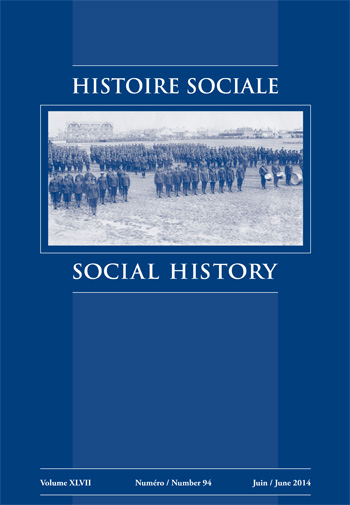Be British or be d–d”: Primary Education in Berlin-Kitchener, Ontario, during the First World War
DOI:
https://doi.org/10.1353/his.2014.0033Abstract
Prior to the First World War, the sizeable ethnic German population of Berlin, Ontario, was praised by Anglo-Canadians and even Governors General for having positive racial qualities and for forming the most desirable type of citizens. During the war, however, owing to their ethnicity, these same people were judged to have failed in their duties of citizenship, measured now in supporting the war effort with manpower, money, and enthusiasm. Public schools in Berlin sought to compensate for the supposed failings, as citizens, of the city’s residents. Although they had previously supported an understanding of Canadian citizenship that accepted Germans, schools now sought to make students ashamed of their German heritage and taught a version of Canadian citizenship that stressed Anglo-conformity and rejected German ethnicity as one of its components.
Avant la Première Guerre mondiale, les Canadiens-anglais et même certains gouverneurs généraux faisaient l’éloge des nombreux résidents allemands de Berlin (Ontario), dont ils appréciaient les qualités positives et qu’ils dépeignaient comme des citoyens du meilleur calibre. Au cours de la guerre, cependant, on leur a reproché, en raison de leur origine ethnique, de manquer à leur devoir de citoyenneté, devoir qui se mesurait maintenant à l’aune de la participation humaine, financière et morale à l’effort de guerre. Les écoles publiques de la ville ont alors cherché à pallier les lacunes supposées des résidents. Bien qu’ayant auparavant défendu une définition de la citoyenneté canadienne inclusive pour les Allemands, elles se sont mises à dénigrer la culture allemande et à préconiser une version de la citoyenneté canadienne insistant sur la conformité anglo-idéale et rejetant toute trace d’ethnicité allemande.


